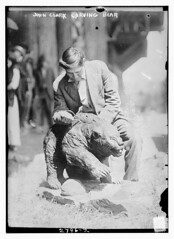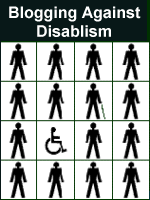 [visual description: blog carnival logo featuring an old photo of a hospital, superimposed with the words "Disability Blog Carnival: Can't shut us up now"]
[visual description: blog carnival logo featuring an old photo of a hospital, superimposed with the words "Disability Blog Carnival: Can't shut us up now"]Terri at Barriers, Bridges, and Books gives us a collection of links around the theme of "Story"--go have a page through some stories and thoughts on telling stories about disability.
The June carnival host is Dave Hingsburger of "Rolling around in my Head," and he has an original plan for his edition... I'll let him explain it, but do stay tuned, it's an interesting idea!
And after that... well, what? I don't have any hosts lined up beyond Dave H. Recent hosts have expressed disappointment with getting fewer submissions than they hoped for. Blogging is probably down across the internet, and there are many other ways to share links to interesting blogging these days. The blog FWD does a daily digest of recommended reading, for example. Wheelie Catholic and others are using Twitter to share links to the things that grab them. Maybe the carnival format has run its course? When I asked this question last summer, folks said they wanted the carnival to continue, so it did. How about now? And if you want it to continue, which month will you host? ;)

